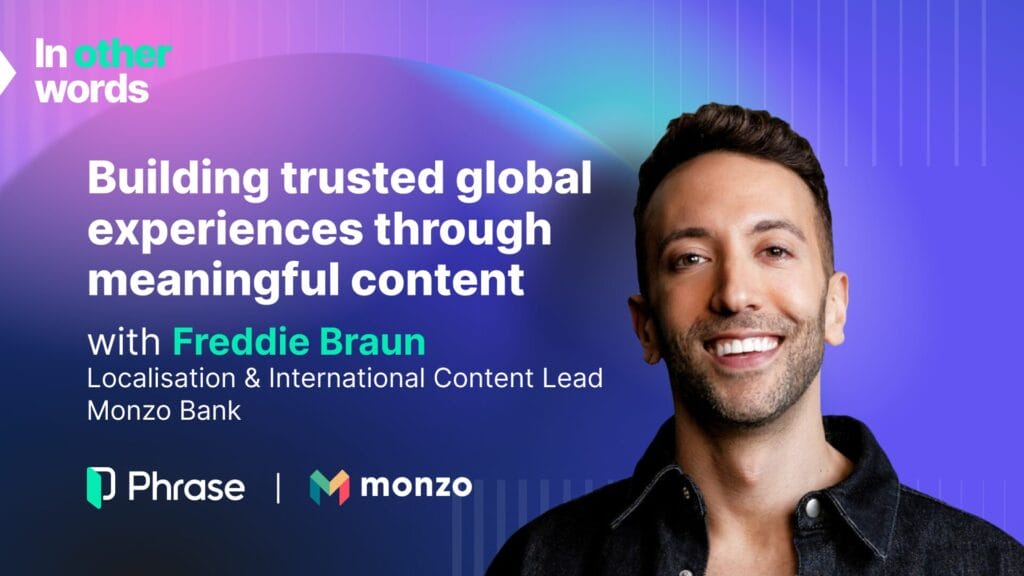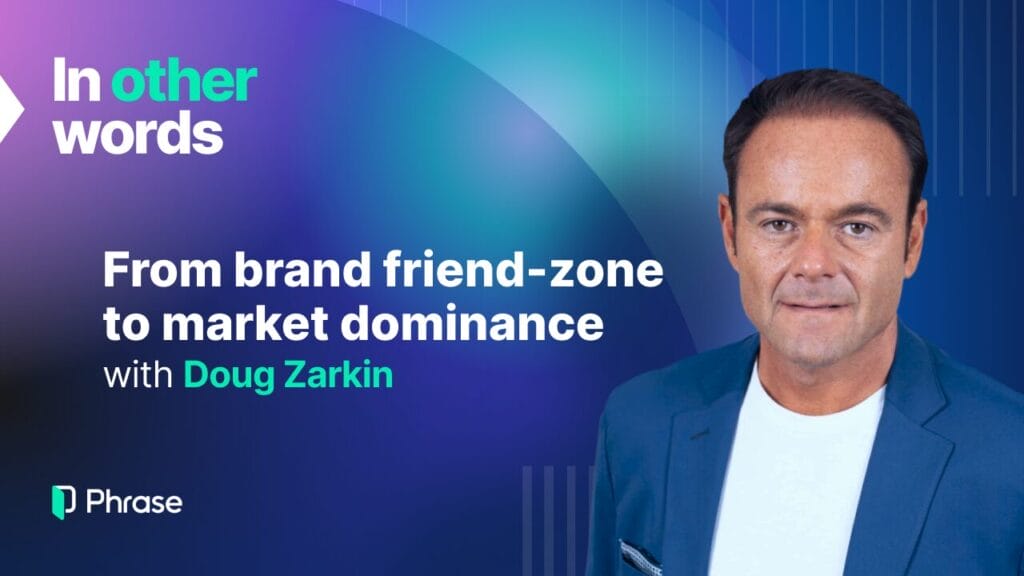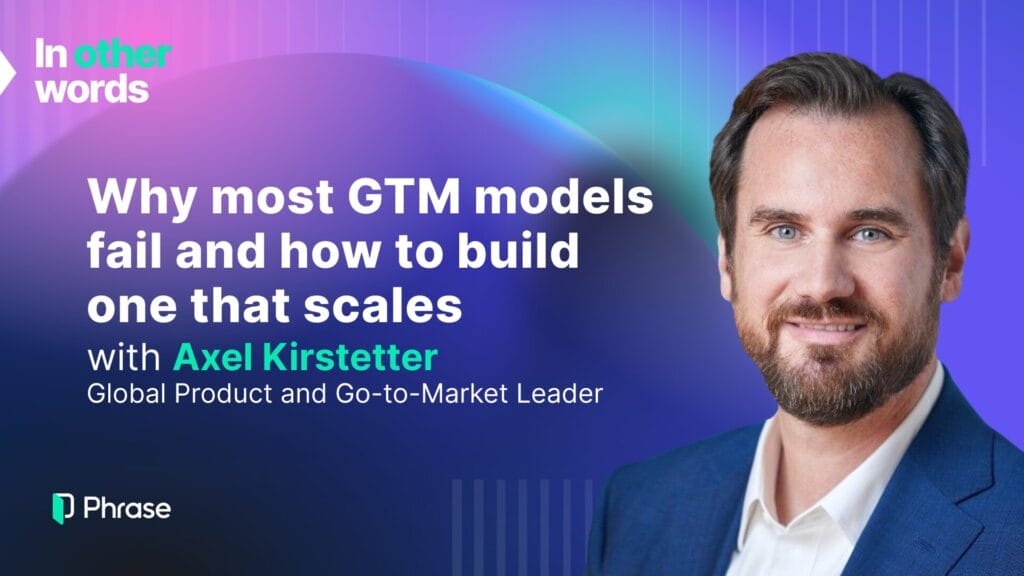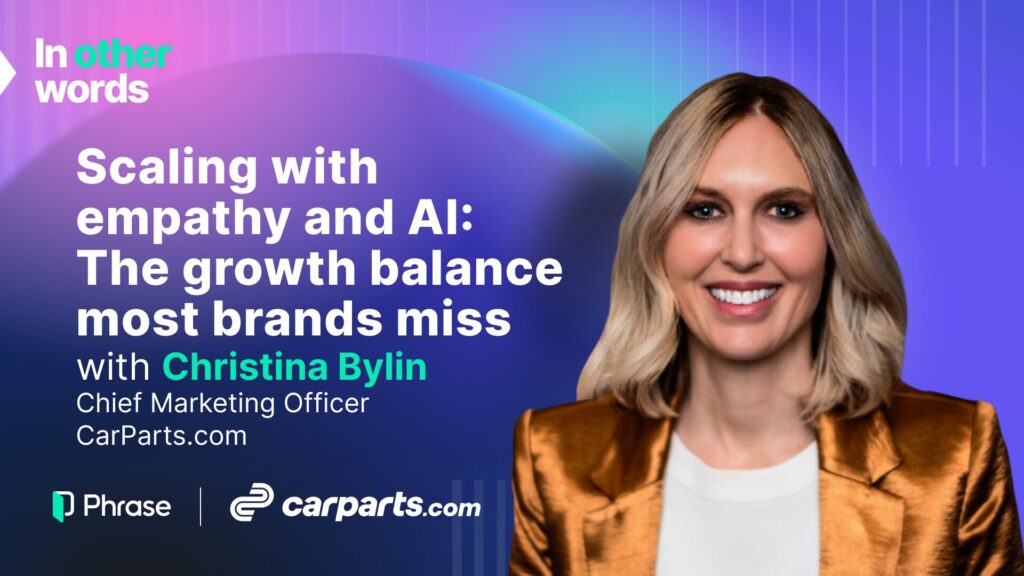Executive summary
For Lorena Morales, Director of Global Digital Marketing Revenue Operations at JLL, the hardest part of scaling a global business isn’t the technology involved, but the human behavior that drives real growth. After nearly a decade pioneering revenue operations in hyper-growth startups and now in a Fortune 200 company, Lorena believes success comes from unlearning fast, auditing people before tools, and aligning teams around purpose, not just process.
In her conversation with Phrase CMO Jason Hemingway on In Other Words, she explains why “functional silos” aren’t always bad, how OKRs gave JLL’s marketing organization a true North Star for the first time, and why operational agility depends on empathy as much as efficiency.
From automating manual lead tracking to using AI for RFP analysis and note-taking, lorena doesn’t see technology as a replacement for human judgement, but as an amplifier, and in leading a distributed team across 80 countries, she reminds us that the secret to alignment isn’t dashboards.It’s trust.
Building revenue operations before it had a name
Lorena Morales didn’t plan to end up in operations. A product designer by training, she began her career obsessed with how things were made. That’s until she realized she didn’t understand how they were sold.
“I understood how to create everything. Products, services… but I didn’t know how to sell them,” she recalled.
That curiosity pulled her into marketing, where she rebranded a string of Silicon Valley startups and learned firsthand how creativity fuels growth. But what set her apart early was their proximity to leadership. “I always reported to the CEO,” she said. “That’s how I got deep into the numbers of the organization.”
From there, she helped launch one of the first consultancies offering revenue operations as a service. It was a role few understood at the time. “It was like a religion,” she joked. “You had to trust the numbers would go up, even before you could see it.” The experience taught her to sell the concept of alignment itself, and to build belief in data-driven decision-making long before “RevOps” became a common discipline.
Learning to unlearn at a 300-year-old enterprise
When a contact told Lorena that JLL, a 300-year-old global real estate leader, was looking to build a revenue operations function from scratch, she was intrigued. “It was a challenge,” she said. “They had never had anyone in this position before.”
Moving from hyper-growth SaaS to a Fortune 200 enterprise required a new mindset. “Revenue operations isn’t the same flavor everywhere,” she explained. “There are no best practices. You have to unlearn fast.”
That ability to unlearn, that is to drop old playbooks and reframe success, became her superpower. “Everyone comes in wanting to scrap everything and start again,” she said. “But someone built what’s already there. If it’s working, don’t make more mess.”
Instead of breaking silos, Lorena learned to distinguish between functional and harmful ones. “If your silos are in data, you have a problem,” she said. “But micro-teams in operations or sales ops can be very functional. It’s about knowing where the pain really is.”
Her first year was dominated by meetings… hundreds of them.
“Ninety percent of my job was listening. Auditing isn’t just tools. It’s understanding who feels the biggest pain points, and why.”
– Lorena Morales, Director of Global Digital Marketing Revenue Operations at JLL
Alignment through accountability
At JLL, alignment is an ongoing experiment. For Lorena, misalignment starts when change doesn’t touch a personal fiber. “If something doesn’t affect you personally, you won’t prioritize it,” she said. “And that’s human behavior.”
She traces the roots of misalignment back decades to the classic sales and marketing divide. “It started when marketing was sending trash leads and sales said, stop sending me trash,” she laughed. “That was twenty years ago, and it still echoes today.”
When she joined, JLL didn’t even have enterprise-wide targets. “We didn’t have OKRs until 2023,” she explained. “Once they arrived, it was a game changer. Suddenly, people were accountable, and they started asking my team for help.”
OKRs created what Lorena calls the “personal fiber connection.” Once leaders saw their own objectives linked to revenue and pipeline, alignment became tangible. “It wasn’t me saying, let’s partner,” she said. “It was them saying, I need you.”
But she cautions that OKRs only work when systems catch up. “If the people setting the OKRs aren’t in the day-to-day, there’s a gap,” she noted. “You can’t ask teams to hit targets when they don’t have the tools to measure them.”
Scaling visibility across 80 countries
With over 300 offices worldwide, JLL’s marketing ecosystem balances central strategy with regional execution. Lorena’s’ team runs a global lead management program but gives regional marketers the freedom to adapt messaging and tactics.
Budgets are centralized, but content isn’t. “The local regions can absolutely use the global content for their own purposes,” she said. “Even if the money doesn’t come from the center, they can leverage the messaging.”
Her team acts as connective tissue, tracking both centrally led and localized campaigns within a unified dashboard. “That’s why you have a revenue operations function,” she explained. “You have to know that, yes, one is central, but there are other activities happening simultaneously. You need to take the temperature on all of them.”
To maintain alignment, Lorena’s’ team holds regular office hours by region. “It’s like a trade show,” she said. “You don’t just bring sales, you bring customer success, because they have the answers. In office hours, you bring the people who can solve problems, not just say, let me get back to you.”
Metrics that matter
Lorena’s ’ operational philosophy revolves around a few key metrics. “You should always look at value conversion rates,” she advised. “But in my world, sales responsiveness is number one.”
Because her team manages lead handoffs across regions, she tracks how quickly and consistently sales teams follow up. “That tells me the level of trust between marketing and sales,” she said.
Beyond that, pipeline and revenue remain the universal scorecard. “Fee revenue and general revenue are separate for us,” she explained. “Understanding both is critical before you can move to things like LTV or churn.”
The goal isn’t more data. It’s more clarity. “We’re trying to make reporting more digestible for people who aren’t data-driven,” she said. “That’s where AI will help the most.”
AI: an amplifier, not a replacement
Lorena’s approach to AI is pragmatic. “It’s an amplifier, not a replacement,” she said. Personally, she uses it to check her work rather than do it. “I’ll write an email and then ask AI, what did I miss? That’s how I use it. I don’t want to lose my ability to think.”
She’s especially fond of AI meeting note-takers. “They help me visualize what happened and match it with my handwritten notes,” she said. “That’s how I stay sharp.”
At an organizational level, AI has begun easing cognitive load by processing RFPs and RFIs across JLL’s massive client base. “The amount of time it would take a human to read through all that is huge,” she said. “Now I can ask, what has been a good RFP for this client in the past two years, and get a summary instantly.”
Her team also experiments with AI for lead qualification, using historical data to predict success based on property size and deal history. But she remains skeptical about “agentic AI” sales tools. “They need to learn from somewhere,” she warned. “If humans haven’t figured out what good looks like, how will the AI know?”
For JLL’s multimillion-dollar deals, she believes the human element will always matter. “People want someone to sit down with them,” she said. “Think about sports. The best part is the human failure. That’s what creates emotion. The same is true in business.”
Leading with empathy and trust
Lorena’s’ leadership philosophy is deeply human. “I care about people’s nine-to-five,” she said, “but I care even more about their five-to-nine.”
Having taught during the pandemic, she learned to read emotional cues through a screen. “I’d ask, what color is your brain today?” she said. “If someone said red, I knew how to approach the conversation.”
She keeps her team’s personal milestones close, sending small gifts, staying in touch during parental leave, and always asking one key question: Are you truly at 100%? “If someone says they’re at 70, that’s okay,” she said.
Her goal is to remove fear from the workplace. “People won’t tell you the scariest things until they trust you,” she explained. “The faster you earn that trust, the sooner you can fix what’s broken.”
Tools are tempting, but discipline wins
When asked about the most common mistake she sees in scaling revenue operations, Lorena doesn’t hesitate: “Buying too many tools.”
“The temptation is real,” she admitted. “Every new platform promises to fix your problems, but if you don’t understand how you’re selling or what your teams actually need, you’re just adding debt, what they call tech debt.”
Her first advice to anyone building a RevOps function: “Spend enough time in the CRM. Really understand how you sell, what stages deals get stuck in, and why. Don’t come empty-handed to meetings. Do your homework and ask the seed questions that make people tell you the truth.”
Unlearning as a growth strategy
For Lorena, unlearning is more than a slogan. It’s a survival skill. In a world where change is constant, she resists the Silicon Valley cliché of “resilience.”
“Resilience isn’t about bouncing back, it’s about adapting and becoming a better version of yourself.”
– Lorena Morales, Director of Global Digital Marketing Revenue Operations at JLL
Global growth, she insists, is never smooth. “It’s painful,” she laughed. “But it’s worth it.”
And that balance between process and people, data and empathy, technology and trust, is exactly what defines the next generation of global marketing leadership.
Hear more
If you’ve enjoyed this look at the highlights from the latest episode of In Other Words, you can hear the entire episode now on our website, or subscribe via Spotify, Apple, or wherever you listen to your favorite podcasts.






